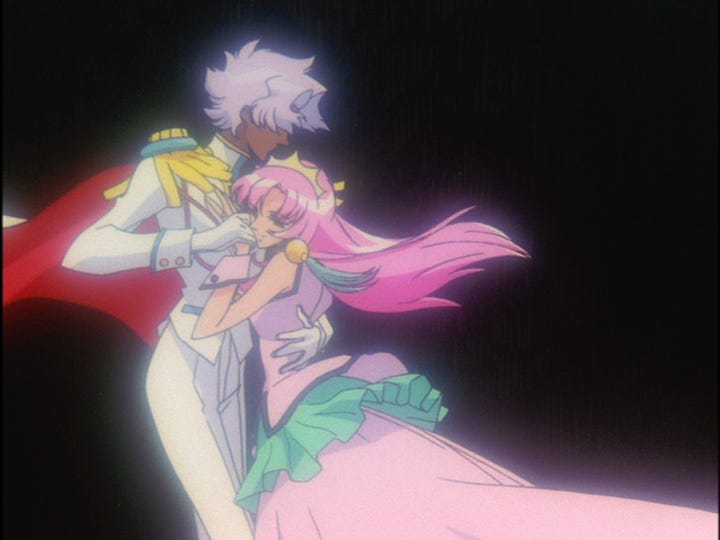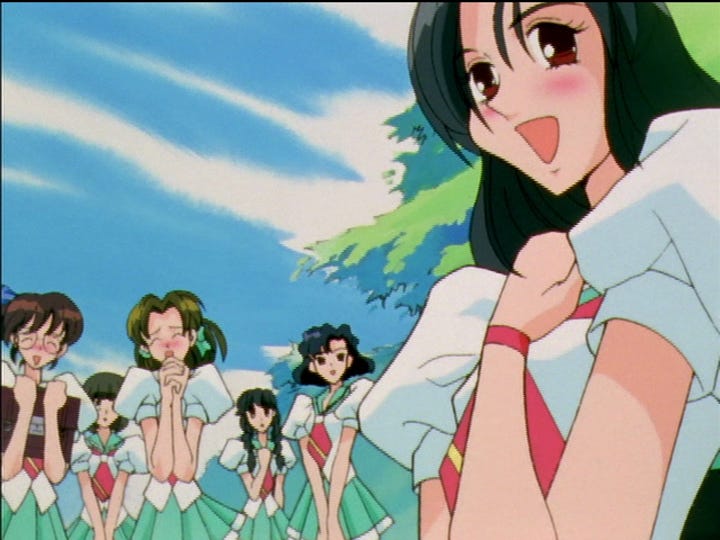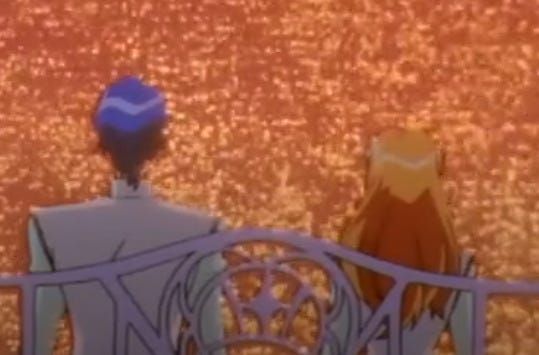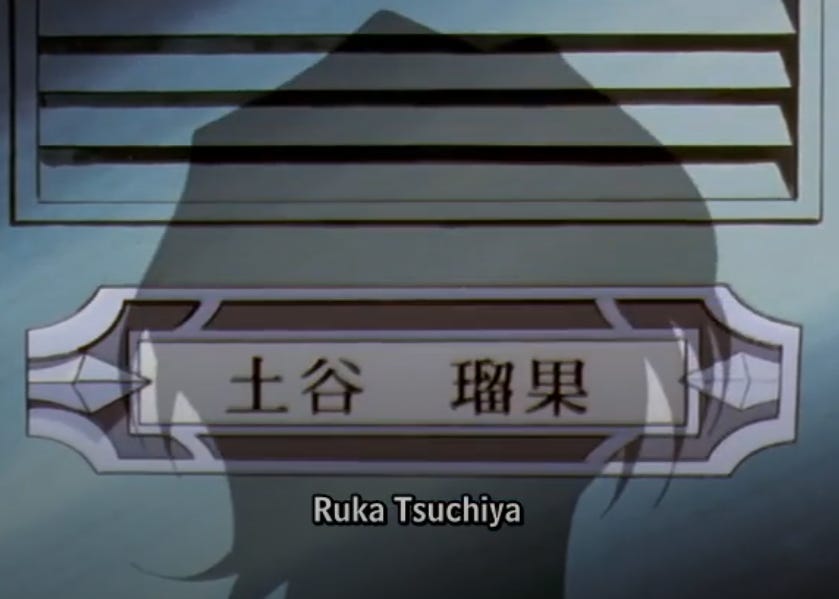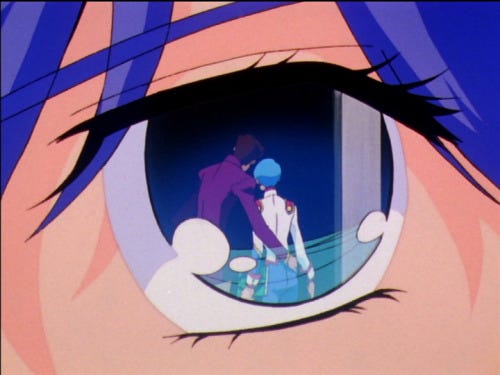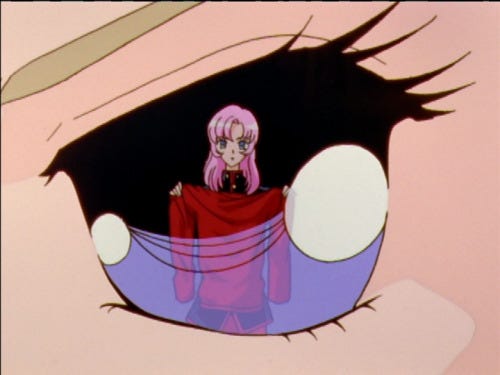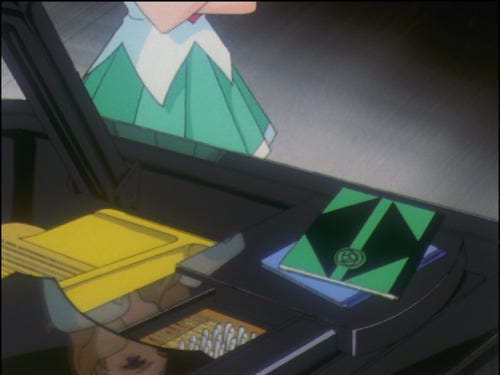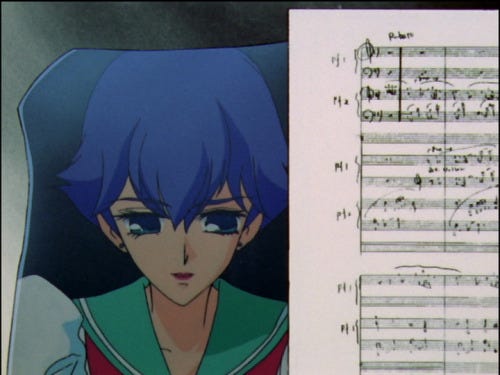The Earth is a Museum, a Glass Shelf: The Analysis of Utena (English)
Or “Outline of a Holistic Analysis of Utena”
Shoujo Kakumei Utena is a series with a lot to analyze, but I feel that most interpretations I have seen have failed to provide an overall explanation of the narrative, so I have decided to outline a “holistic interpretation of Utena.”
I don’t think a holistic interpretation is necessary to understand the series, I think the thematic heart of the series can be understood without this in mind, but I took on the project of creating one as an intellectual exercise.
Before I state my hypothesis I will make some clarifications about my methodology.
First, I do not consider the film to be “canon,” so I will not be taking it into account. It is too different from the series for me to consider it part of a single text. The same applies to any other adaptation such as the manga.
Second, in my attempts to decipher Utena I have come to the conclusion that the elements in the series have 3 “layers” of meaning: the literal, the social meaning (i.e. social criticism) and the personal-subtextual narrative which I will expose in this text.
I don’t think the layers are mutually exclusive, I think they actually connect. It is a general rule that I made up, it does not necessarily apply in the same way in every case.
Third, I will try to make as few assumptions as possible. That is, I will try to support everything I say using evidence.
Fourth, this is more of an “outline” of a holistic theory rather than a true holistic theory, as while working on this, I realized that for this to be truly holistic, I would have to do an incredible amount of elaboration. I apologize if anyone is disappointed by the shortcomings in this analysis.
My working hypothesis is that the entire series is a representation of Anthy's personal and inner journey, specifically her personal narrative regarding a series of traumatic events in her life.
In other, less pretentious words, the entire series takes place inside her mind.
Now, I know this will automatically invoke some complaints, as these kinds of ideas have a certain Matpat-esque vibe to them that everything is a dream in a coma or whatever, but I can justify it.
I don't think the series is necessarily a dream (though at least if it is symbolically like one) or a delusion, but I do think it is a representation of a character's (Anthy) inner narrative, and therefore its events are not something that happens literally.
Now, I'll quickly explain my main reasons for believing this:
1 First is the obvious fact that Utena is a series that works more metaphorically and symbolically than literally. If we try to interpret it as literal, we end up with an incomplete and unsatisfying story.
However, if we interpret it the way it should be, as metaphorical, then we can see that the surface narrative is a signal towards something else, possibly another narrative, as I argue.
2 Not only is there the first point, but several parts of the series emphasize the artificiality of the story, bordering on breaking the fourth wall.
For example, several stylistic tricks from other art forms, such as theater, are used. As a specific example: in several scenes everything is dark at first and then there is more light, as if it were a stage where a new scene begins, like in the first ending.
Most notably, there is the series finale, where Akio reveals that many of the scenes seen are just “illusions,” projected by his planetarium. He literally says that the only thing that is real is “this room,” his living room where he raped Anthy—in other words, Anthy’s trauma is the only thing “real.”
(Note that this image is set up in such a way that it looks like a curtain has been pulled back to reveal Anthy, like a stage curtain in a theater. Backstage in the play that is Utena, there is Anthy’s trauma.)
3 The constant presence of the concept of cycles in the series, so prevalent that there is no need to even list the examples.
One could respond that this is just thematic and does not reflect the diegetic narrative of the series, but there are two scenes that make me think that this eternal recurrence is diegetic on one level.
The first scene is in episode 23, when Utena wakes up from dreaming about her realization that eternity does not exist to find Anthy sleeping next to her.
We are then shown the shot of Anthy and Utena's hands parting ways
This is the same shot from the opening sequence, with the only difference being that this version has less sparkles, and it's an obvious case of foreshadowing for the end of the series.
(Note: I assume the fact that the version of the opening sequence has sparkles is a reference to Utena and Anthy's relationship being Anthy's "shiny thing." The lyrics of Rondo Revolution mention Miki's garden immediately after the shot, so this makes sense to me. I don't know if there's any significance to the sparkles being reduced in the episode 23 version, though.)
To me, this moment implies that Utena briefly remembers this event, her separation from Anthy. But how can she possibly remember something that hasn't happened yet?
Unless it has already happened, of course.
Although well, I'll admit that it's possible to interpret this scene differently, this is just how I take it. The next one, however, is more explicit.
The second scene is during the final duel between Touga and Utena.
In this scene Utena straight up says that it feels like she's dueled with Touga dozens of times already, it's hard to interpret it any other way. (Throughout this entire episode Utena has been close to remembering meeting Anthy, so at this point she's closer to the "true" past.)
Examining these 2 scenes, I came to the conclusion that on some diegetic level, the events of the plot are repeating themselves.
I don't think the series is literally a time loop, but I think this cyclical nature represents the fact that Anthy has been dealing with these traumas, with these thoughts for a long, long time. They're a series of events that she's mentally replayed so many times that they've become corrupted and changed.
Why do I think it's specifically Anthy who is the point of view character? Why not, say, Utena? Because Anthy is, frankly, the character of greatest importance. The entire plot revolves around those who try to control her.
Briefly, these are the reasons why I believe Anthy is our point of view and not Utena:
-Adopting this interpretation means that Anthy is actually the character with the most agency in the entire narrative, as the entire narrative is her creation. It is a step up from what we already see in the series, that although Anthy is seemingly passive and weak, she is actually of great importance. The layers of her personality exist in the subtext of the narrative itself.
-In the series there are several unexplained acts that are normally assumed to be the work of Anthy through magic. With this interpretation, we can take those acts as Anthy's actions, but through her mind, as the entire narrative is a reflection of it.
-The way Anthy is shown. At several points, Anthy would seem to teleport or change appearance, as if she were an illusion.
Many seem to assume that the Anthy in the coffin is Anthy's true physical form, but Anthy seems to be completely fine after that coffin falls into nothingness.
I think that none of the Anthys we see are actually the “true” ones, since the series is a story of her, each representation of her is a reflection.
-Related to the second point, several people seem to assume that Anthy and Akio are literally some kind of magical beings, which I find to be an unsatisfactory interpretation. To believe this, we have to make a long series of assumptions about the literal existence of magic in the series. With my interpretation, it is only necessary to make a minimum of assumptions, instead of assuming the existence of an entire system of magic that is never explained.
Now, am I saying that the point of the series is to discover the “true” story? Well, no.
The thing is that I think that by this point the “true” story has been buried by trauma, it is a story that has been repeated so many times that every line has changed. It is a total palimpsest.
Of course, we can make a number of assumptions about what happened (Anthy surely suffered some kind of sexual abuse from a family member, and there was probably another girl involved with her), but we can never know for sure.
I think one hint at this is the scene in Episode 26 where Utena and Anthy talk about Miki's garden, which I also think is a clue about the general nature of the narrative.
It is suddenly revealed that the entire scene was Anthy telling the story to Akio, and she says that she doesn't know what Utena said about Miki's garden.
Translating to the entire narrative: Anthy tells the events to Akio (i.e. Anthy thinks about the events due to the trauma caused by Akio), but she herself doesn't know all the details (she has forgotten the truth from repeating it so much, or her knowledge has gaps).
Also, there is the recurring theme of characters forgetting things. (Juri forgets the name of the boy who saved her sister, everyone forgets Utena, the events of the Black Rose are forgotten, etc.)
Instead, I think what's important is the evolution of Anthy's perspective on this narrative, to see how she feels about it.
Throughout the article I'll discuss how this interpretation takes on various specific characters (the main ones and Mikage), talk about what we see first, and end by talking about the end of the series.
What do we see first?
Let's start literally from the beginning, the first scene of the first episode. The reader will probably think I'm referring to the fairy tale that serves as a background for Utena, and yes, I will talk about that, but before what we actually see for the first time.
The opening sequence, in which Rinbu Revolution plays (which should actually be translated as Rondo Revolution, but whatever).
Sure, usually an opening sequence doesn't have that much direct relevance to the plot. Yes, they convey information, but they're not a significant "clue." But, since the opening sequence is literally the first thing we see before any other scene, I think it deserves closer scrutiny.
I won't do a full analysis of the sequence for space reasons, but I'll highlight the important bits.
What we see is something like this: Utena and Anthy start out together, inside a rotating rose. Afterwards, they are separated. The last thing we see is Utena alone inside one of the roses.
This sequence informs us of the overall arc of the series: Utena and Anthy will be separated, even if they are together at some point.
I think it's very important that this is the first thing we are informed about. Being the first piece of information, it is then the foundation of the entire narrative, the fate of which we already know from the beginning.
(I think Utena is the one in the pink at the end because the Utena we see in the series can't leave the narrative like Anthy can, being a version specifically of Anthy's memories.)
Now, let's focus a bit on the song itself.
The lyrics of the song reinforce the idea of the animation from the opening sequence: two people are separated, but still the singer hopes the other will “take her revolution.” It seems quite possible to me that this song is from Utena's perspective, so the song may be the only “pure” (i.e. beyond Anthy's view) view of Utena's perspective in the entire series.
Now, let's finally talk about the first scene.
The first scene of the series is a mythologized version of Utena's memory. As Mikage will later put it, "An eternal memory." As we will learn, there is more to this memory than what we are told.
This memory is repeated several times, and with each occasion, it seems more cynical and less sincere. Just like the plot of the series: the duels are repeated, and although at first Utena winning them and "getting" Anthy was set up as heroic, the more it goes on and the more it is repeated the more cynical and futile the whole thing becomes.
Later we are shown the truth about this, but I think even then we are not given all the information.
Why? Because it is revealed to us in a dream, implying that it is still Utena's subjective perspective of what happened. Also, several details of the scene are incongruous: Utena is not in a coffin and God changes age.
This final version of events is definitely closer to the truth than the beginning, but we never get to see it all directly.
That is, we are never shown the direct truth of the beginning of the narrative.
As a final note, this is the first scene after the fairy tale: Wakaba waits for Utena, worries about her, and describes her as her “boyfriend.”
And Utena never comes.
Mikage, the key to the narrative
Mikage gets his own dedicated section because he is my Rosetta stone for deciphering the narrative, his role in the narrative was what made me think about the whole interpretation.
As an introduction to talking about Mikage, I will talk about Kanae and Utena.
Utena’s second duel with Touga is a duel to “claim her true self.”
When Kanae, in the duel immediately after this one, faces Utena, Kanae says that the self she is thanks to the black rose is her true self.
What's more, Kanae is introduced with a frame of pink roses, just like Utena. Kanae occupies the position that Utena would have if Akio achieved his goals.
Kanae is a distorted reflection of Utena.
During her duel with Utena, the arena is filled with white lilies, which have a famous association with lesbianism and “yuri” in Japan. Kanae destroys these lilies while fighting Utena. Kanae wears orange, which is the color of Juri, who is tormented by her unrequited love.
And besides, she and Mikage are the only two Black Rose duelists who don't draw their swords on someone else.
The Black Rose Saga begins with Utena fighting a reflection of herself, a sort of omen of things to come, and ends with her fighting another reflection, Mikage. It's an evolution of Utena reclaiming her self and then having to fight reflections of herself.
Anthy and Kanae seem to have a strangely intense relationship considering how little they appear to have interacted. It makes sense that Kanae would hate Anthy if she's a version of Utena who's fully embraced the role of princess. It makes sense that Anthy would hate Kanae if she's a version of Utena who's completely given up on it.
With Mikage, we can apply Occam's razor: the simplest explanation for something is probably its response.
Why does Mikage seem to cease to exist, why is her entire existence strange and ethereal? Well, Akio tells us straight up at the end of the arc: Mikage never actually existed.
Mikage's backstory is one of the strangest parts of Utena, as it just seems to go nowhere, it doesn't seem to fit in with the rest of the narrative.
However, there is a way to make it fit: by assuming that Mikage is not real at all. Then, we can interpret his plot as a message from something else.
If Mikage is not real, then we are forced to make a number of assumptions about the nature of the narrative.
As Mikage breaks down, Mamiya starts talking to him. In fact, he gives him a rose, which shouldn't be possible if he's just a hallucination. Therefore, I think he's not just a hallucination, but messages from Anthy, who is actually Mamiya.
And here we come back to my general hypothesis.
Mikage's duel song, Watashi Kuusou Seimeitai, makes Mikage's nature quite explicit, and is another clue I have for my general hypothesis.
Here's my theory: Tokiko and Mikage are the same person (well, representations of the same person), meaning they are two other representations of Utena.
Ohtori Academy says that every person is either a prince or a princess, so Utena who has characteristics of both is split into two: Tokiko the princess and Mikage the prince.
You might think this is odd, considering Mikage projects her romantic feelings for Tokiko onto Mamiya. But what does Utena say about her feelings for Anthy in the suicide attempt scene?
She says that her dynamic with Anthy was based on Utena's ego.
Also, Mikage says that he and Utena are equals at the same time that Mikage projects Tokiko onto Utena, so he is implicitly saying that he and Tokiko are equals.
Tokiko is seduced by Akio, and immediately Mikage decides that he wants eternity.
Tokiko wants to keep Mamiya eternal, because Anthy's feelings for Utena are what keep her in her own eternity of living in those eternal memories.
And why is Tokiko Mamiya's sister? Because Anthy feels that her and Utena's relationship is just a reflection of her incestuous abuse at the hands of Akio.
Mikage is also a distorted version of Akio: Akio lives in a tower reached by an elevator. Mikage lives in a basement reached by an elevator. Akio manipulates people into being duelists and sexually abuses Anthy, onto whom he projects something lost. Mikage manipulates people into dueling and sexually abuses Mamiya, onto whom he projects something lost.
(Note: An elevator is something that can only transport you to what the elevator is already connected to, what the elevator has been to before. In that way an elevator is a type of route. That's why there are so many elevators in Utena.)
Mikage is shown as cold and disconnected from his emotions, but considering his connection to Utena, I think it's more likely that he was in denial about his own feelings, the same way Utena is in denial about the aspects of the world that she doesn't accept.
It's subtle enough, but I think Mikage's sacrifice of the 100 boys is a parallel to Anthy's stabbing: Both acts happen after Akio seduces Utena/someone like Utena. The big difference is that it's an unforgivable act committed by Utena's analog, not Anthy.
During the stabbing, we're not shown Utena suffering any injuries. At the end of the Black Rose arc, Miki says that no one died in the fire.
I'll talk a bit more about Utena and Mikage's relationship in the last section, where I discuss Utena and Anthy's relationship further.
Juri and Shiori
There's something pretty weird about Shiori.
During her spotlight episode in the Black Rose Saga, more than once we get these weird shots of Anthy that don't seem to add anything. What they have in common is that they happen after Shiori is mentioned.
Here are all of these shots:
(At the beginning of the episode)
(After Utena starts talking to Juri. This shot might parallel the other shot where Shiori looks out the window and sees two girls holding hands. So maybe Anthy is thinking about her relationship with Utena right now?)
(This last shot is when Shiori says that her dueling self is her true self, and as the shot focuses on Anthy, Shiori says that she is not her previous self who was inferior to Juri.
Afterwards there are 2 shots of Anthy watching the duel, but this one falls within the normal range of Anthy shots.)
Also, certain behaviors of Shiori are… incongruous.
First, she asks Juri whose photo is in her locket. However, how does Shiori know about that locket? We can assume that Juri only started wearing it once she separated from Shiori. And it is obviously something quite private to her, probably not common knowledge in Ohtori.
I guess it's possible that Shiori heard a rumor in Ohtori or something. But you know who definitely knows about the locket? Anthy, as we see at the beginning of the episode.
And also, in the elevator, Shiori talks about how Juri is loved by everyone. Except Juri isn't.
From what we see, people seem to be instead afraid of Juri. From how characters comment on her, it seems like she's a mob boss, talking about how she can make people disappear. We never see her have any admirers beyond Ruka, but we'll talk about that later. Yes, in the final scene of episode 29 a girl from the fencing club seems to think highly of her, but I'd say this is a sign that Juri can move on with her life at that point (I'll continue with this later).
Sure, it's possible that Shiori just has a twisted perception, it's not like she's the most trustworthy person in the world. But still, do you know who is loved in Ohtori?
Utena.
(These are some of Utena's admirers.)
Also, let's look at Shiori's duel song, Chikyuu wa Jinbutsu Chinretsushitsu.
There are two important points in this song:
1 First, the concept of dualities, and twins. Could this refer to Shiori and Anthy, saying that the two are “twins”? Or perhaps to the two relationships of Anthy and Utena/Shiori and Juri?
2 Second, the idea of “the earth as something artificial.” That is, it can be seen as a clue that what is happening is not “real.”
So, what does Shiori tell us about Anthy? Well, I think Shiori is a mix of Anthy's resentment and the part of Anthy that yearns for the past that Utena had, but at the same time resenting Utena.
Anthy obviously feels some level of resentment towards Utena, as we see when she stabs Utena. And this resentment shows on the surface with Shiori, who perceives Juri as feeling superior to her.
So, we can assume that Anthy thinks that Utena feels superior to her. And of course, she has a point: After all, Utena herself admits that she only focused on her own ego during the suicide attempt scene.
When Shiori talks about the good times she spent with Juri and the unnamed brown-haired boy, this has a double meaning: she is also talking about the time Anthy spent with Akio and Utena. Of course, she throws herself at Ruka's feet.
Some wonder why Juri even loves Shiori considering how unpleasant Shiori seems, but if we assume that Juri loves Shiori for the same reasons that Utena loves Anthy, then we have one answer: Juri loves Shiori because she wishes to “save” her. This would make sense considering what happens in episode 29.
Also, in episode 37 Juri outright says that she only thought about herself, which is obviously similar to what Utena says in the suicide attempt scene. In Utena, wanting to save someone is in itself a way of projecting superiority.
What's more, in that same episode, Juri says that if she had the power of miracles, she would only use it to save Shiori (from Ruka). The parallel with Utena is obvious.
Juri is an Utena who on the outside no longer believes in princes, but is unable to not see her relationships from the same perspective. Shiori MUST be saved. No wonder Shiori sees herself as inferior to Juri.
Knowing this about Shiori, we can then see Juri in a different light.
Juri is like Utena, a fighter in boy clothes, and like Utena she is known at school, although Juri has more influence and is more feared than loved. She is also older than Utena.
Here's my theory: Juri is an idealized version of Utena, and also what Anthy thinks she would be like if she were to meet her again. Therefore, Juri is a version of Utena who can no longer deny things, who can no longer believe in a prince, but who still clings to the past.
Juri has a minor role in episode 12, but it's a significant one. She's the one who starts talking about narrative endings (while reading a book) and gives her sword to Utena, mentioning that she'll need it for the "final scene."
On its own it's kind of odd that Juri is given this strange metatextual role, but if we assume that she's a representation of Utena after she's separated from Anthy (i.e. after the narrative) then it makes more sense.
Knowing this gives a double meaning to Anthy's words during Touga and Utena's duel, where she thinks about how she's seen it before and Utena is like a god. The first arc of the series is our first full instance of the "background narrative."
Also, let's look at what Juri looks like in the flashback in episode 28. It's very short, so it would be forgiven if others who watched the series didn't notice, and you don't get to see much of it, but we can see that she has a haircut and texture that is more similar to Utena's.
It's a very minor detail, but it's significant to me.
(So when Juri has straighter hair and feminine clothes, she's closer to her past and more vulnerable.)
This puts every interaction between Utena and Juri into a new dynamic. Juri literally talks back to her past self.
Juri is the only council member who is never directly defeated by Utena, in both duels an external factor determines Utena's victory.
Juri is the council member who is most actively manipulated by Anthy, Anthy practically flirts with her. Sure, it's possible that it's just manipulation without feeling behind it (we have to take every interaction Anthy has with council members with a grain of salt), but perhaps there's a portion of genuine feelings.
Now, let's talk about Ruka.
It took me a while to figure out how Ruka fits into it all, but I came to a conclusion: Ruka isn't real.
Well, none of the characters are "truly" real, but Ruka is even less so than the others.
Let's think about it: Ruka is this super talented and influential duelist who was apparently a big part of Juri's life, but she never mentioned him. He's also a high-ranking member of Akio's hierarchy, though Akio never mentions him before. Once he dies, he's never spoken of again.
Ruka is an embodiment of Anthy's trauma regarding her abuse, her feeling that everything will always inevitably fall back to abuse. That's why he appears out of nowhere to screw up Juri's life.
When he appears in the first shots, only his shadow is seen and his face is hidden, as if he doesn't have a defined identity. Or as if we're supposed to be able to guess who he is already, even though this is impossible, since Ruka hasn't appeared before.
Ruka wants to “save” Juri and unlock her potential, in the same way that Akio wants to “save” Utena and unlock her potential.
With this in mind, we can reflect on her dynamic with Shiori. Shiori is the part of Anthy that yearns for the past with Utena AND Akio, the one that wants to go back to that past, so she immediately goes to bat for her dynamic with Ruka.
It’s a twisted dynamic: Ruka wants to “save” Juri, who wants to “save” Shiori, and what Shiori really wants is for Juri to love her as a person, rather than as an ideal.
At the end of episode 29, Juri gives up on her complex with Shiori. It’s a sad scene, now that Juri has suffered the same dynamic that she put Shiori in, the two are “evenly matched.”
After this happens, Ruka “dies,” because he has already fulfilled his purpose. In reality, Ruka was a ghost just like Mikage. At this point the narrative falls apart, the oft-repeated plot seems artificial.
Juri can interact with other people and move on with her life.
Now that Juri has freed herself from her complex, Shiori can acknowledge her desire to be with her. And why do I think this is a positive development for Shiori? Because I think Shiori's new vision is that she and Juri will "shine together someday." In the end Shiori searches for Juri just like Anthy searches for Utena.
Other Characters
This section is dedicated to all the characters that I don't have enough opinions about in relation to interpretation to give them their own section.
Sure, all of Utena's characters have thematic relevance, but for some I haven't been able to assign a particular role in relation to my specific interpretation.
So, let's talk a little about the characters.
-First, I'll talk about Wakaba. I feel like Wakaba is pretty important due to her very consistent presence in the series (she appears in the first real scene, has several scenes in the last episode centered around her) but I haven't been able to pinpoint a defined role for her with interpretation in mind. She obviously has thematic relevance, being a representation of the common girls in the patriarchal system.
Provisionally, I think Wakaba is either someone Anthy just didn't remember much about, or she's an amalgamation of several people as such. Therefore she's not "special" in the metanarrative. That said, I'm not sure and may change my mind.
-Miki and Kozue are obviously just exposed to Akio and Anthy in Kozue's episode of the Black Rose Saga, this allows us to place their dynamic in the position of a version of Anthy and Akio's dynamic before getting to the level of abuse she's at during the series' narrative.
I also think that her situation possibly informs us about Anthy's parents' situation: that they were absent in her life, for whatever reason. That would explain why parents in general don't have much weight in the series.
Miki is quite important in one aspect: he's the one who introduces us to the idea of memories distorted by excessive idealization.
Nanami and Kozue parallel each other in several ways: their character designs are opposite (Nanami has long and somewhat curly hair while Kozue has short and straight hair, after the first arc Nanami usually wears the duelist outfit while Kozue wears the uniform, their color palettes are opposite), and they have these shots of parallelism in particular.
I think Anthy is “in between” Nanami and Kozue: she’s not as innocent about the system as Nanami but she doesn’t participate in it as actively as Kozue. (Clarification: Yes, Anthy plays a role in maintaining the system in particular in her role as Mamiya, but Kozue practically throws herself into her role.)
So we have a Nanami-Anthy-Kozue trio regarding the system. I’d say Shiori is in between Anthy and Kozue, since she can’t be a participant in incest.
At the end of the series Nanami insists on just forgetting about the whole dueling thing, which while not exactly the way to move on from the events of Ohtori, I think she’s closer than most characters. Kozue seems to take some distance from Miki, though she still seems to be fixated on him. I’m not sure how to interpret her ending, really. Wakaba takes on the role of Utena, which is perhaps a sign of Anthy's change in mindset, allowing the world to move on. I'm not sure.
Conclusion and about the end of the series
This section will focus mainly on Anthy's relationships with Utena but first, let's figure out what Anthy and Akio are.
I don't think Anthy and Akio are magical beings, I think they're normal people, just mythologized by Anthy's memories.
I've already mentioned how Akio outright says that all the "magic" in the series is illusions, so I'll focus on the origins we're given of the two.
The memory of how Anthy became the Rose Bride is full of anachronisms, so I don't think it's literally a glimpse into a reliable memory of the event.
So what is memory, really? I think it's Anthy's version of how Akio's abuse started, a mythologizing of an event she blames herself for.
The whole event has this… suggestive feel to it. Anthy's red dress hangs off her. God's clothes are almost open. The villagers' weapons are phallic.
Dios is an idealized version of Akio, in truth, Akio was probably never this good, mythological figure.
So Anthy tries to defend her idealized view of Akio, and ends his abuse. Thus, Dios dies and Akio comes to his present state.
The whole mythology of Dios being a prince and the Swords of Hatred is simply mythology added to real history: Anthy blames herself for her situation, so in her mind it's like the whole society (which created the conditions for her abuse) hates her. It's just another layer of guilt, only in this one, Anthy is to blame for a heroic sacrifice. She is made into the archetype of a woman under patriarchal society anyway.
Now that we've talked about Anthy and Akio, we can expand on Anthy and Utena.
What is the eternity that Anthy wants? Well, that's easy. She tells us straight up: in episode 37 Anthy says she hopes she and Utena can be together forever.
At this specific moment Anthy may be being disingenuous, but consider this: Anthy told Saionji she wanted to go to the sky castle to see something eternal. “Mamiya” says that a heart that seeks eternity is something eternal. In all of these moments Anthy is manipulating someone, but the best lies have a bit of truth in them.
All duelists seek something eternal. It makes sense that the bride does too.
Back to Mikage, Mikage is the only character who manages to make Utena fully mad, she never gets that angry at anyone else. And why? Because Mikage points out that the two of them are the same, that they both hold on to memories that they want to be eternal.
This is why I think Utena’s denial of reality is at least partially on purpose. Utena doesn't see all the bad around her on purpose, she prefers to cling to the past, and just passively move forward through the duels.
That's one reason why she can't save Anthy. Utena is a creature of the past, and in the past Anthy has no salvation.
Even if a love gives you strength, even if it allows you to survive, sometimes that love must be abandoned. Anthy has to let go of Utena in order to overcome her trauma.
The cantarella scene is, in my eyes, the culmination of Anthy and Utena's relationship.
This scene is of great importance for interpretation, because for me it is the moment when Anthy starts to be able to get over Utena and go to the future.
First of all, it should be noted that treating someone to liquid is a symbol of sexual/romantic interest in Utena. Touga offers Utena a soda, Mikage sees Tokiko's teacup, Wakaba offers coffee to Saionji. So already this scene has a romantic tone.
First, Anthy implies that she poisoned Utena's tea. This has several layers: first, there is an obvious similarity between the Borgias and Anthy and Akio, Anthy is referring to their true nature that Utena saw. Second, there is Anthy's hatred: Anthy is angry at Utena for her continued "cruel innocence", so she tries to do some psychological terrorism against Utena. Third, poison would be something that would kill Utena, so Anthy is indirectly telling Utena that their relationship is not eternal (even though Anthy wishes it were).
Anthy indirectly tells Utena “Look at what I am. Because of this our relationship will not last.”
For a moment Utena is genuinely hesitant, but then she eats the cookie, deciding to trust Anthy anyway. Then Utena says that she poisoned the tea too. Utena recognizes Anthy’s nature and that it won’t last, but continues to be with Anthy.
For a moment Anthy seems genuinely surprised, and then the rose appears which obviously denotes love. Anthy is surprised that Utena partially abandons her “cruel innocence,” and that rekindles her love for her instead of her hatred.
In the above shots Utena’s eyes are only partially visible, showing that she doesn’t know everything, but she is making progress.
Then, the two say that the tea is delicious, and Utena's eyes are fully visible, so Utena is now closer to understanding.
Anthy asks Utena what she plans to do in 10 years, showing Anthy's progress in letting go of the idea of eternity.
And when Utena says that she hopes that in 10 years they will be there drinking tea, the previous shot of the room is repeated, except this time the room is empty and there is a rotating rose in the corner.
The shot is then repeated once more, as Utena tells Anthy to promise that they will meet again in 10 years. The scene ends with Utena and Anthy holding hands.
I think the shot with the empty room represents Anthy's perspective. The rose superimposed is used to represent memories or imaginations at other times in the series. So I think this represents the narrative in general: Utena is gone, and Anthy remembers what already happened. (The rose spins to represent the memory replays.)
However, the shot then repeats again with Utena and Anthy in the room as Utena motivates Anthy to meet again.
Utena’s memory is now motivating Anthy to move on.
(Because of the specificity of saying “in 10 years” it occurs to me that it’s possible that that’s the amount of time that has passed between the original events and the time when Anthy remembers what happened. This would put Anthy’s actual age at 24, which would explain why in certain shots she looks older. But still that could be focusing too much on a not-so-important detail or being too literal.)
Now, let’s talk about the ending itself.
By analyzing Shiori we can understand why Anthy feels hatred for Utena. Therefore, it’s not surprising that Anthy stabs her.
When Anthy stabs her, it's in the style of a play: Anthy draws her sword through Utena's side and doesn't actually cause any wounds. However, Utena acts as if she's actually hurt.
This has several meanings:
1 It's another example of the artificial nature of the narrative, which was confirmed with Akio revealing that it's all illusions.
2 It's an example of the degradation Anthy's memories have had from so many repetitions: At this point, she's mostly just going through the motions.
3 It occurs to me that the "original" event probably wasn't a literal stab in the back, but another kind of betrayal.
What's surprising is that Utena gets up, stands up, and goes to Anthy, opens her coffin.
But Utena can't save Anthy.
Anthy's love for Utena is like Utena's love for her prince: it's something that has given her strength and allowed her to carry on, but it's also something that ties her down and keeps her in one place. That's why in episode 34 when Utena talks about her prince, there's a shot of Anthy looking depressed.
The great tragedy of Utena as a character is that she simply cannot separate her identity from her desired role as prince. This gains another level of metaphor since the Utena we see in the narrative is entirely a memory, something that by definition cannot overcome her own nature.
(Metaphorically, all of Utena's characters are dead, since they live on as memories. That's why Ohtori Academy is a coffin.)
Anthy falls and Utena disappears. But that's not the end.
Thematically, it's important that Utena and Anthy are separated, to show that their relationship is not eternal. If Ohtori Academy is the place where one seeks eternity, then to leave the academy Anthy must give up eternity.
“Revolutionizing the world” and “Someday, together we will shine” are two opposite concepts.
Anthy is able to simply walk away because from the beginning Akio and everything else only had power because they could influence her mind. But they are just memories, they can’t keep Anthy tied down if she keeps moving. The Swords of Hatred aren’t real, the coffin is only a mental one.
Anthy sets out to find the original Utena (whose name might have been Kanae or Juri or Tokiko, but it’s not important), not the Utena from her memories. It’s not necessarily a literal search that she’s going to find the person, but Anthy is now continuing towards the future, to one day be together with someone and take up the revolution.
The last shot of the series is very inspiring. The photos have an obvious connection to the concept of memory: Now Anthy can have her memory of Utena as a memory, something that no longer controls her life. It is a photo, a still object, because Anthy will no longer visit it and change. Akio is out of focus because although Anthy cannot forget him, she can separate her memory of Utena from her memory of him.
Now, Anthy moves on.






